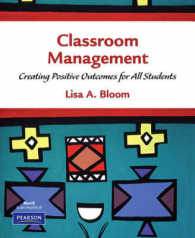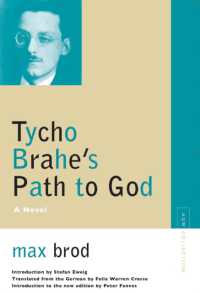Full Description
Technology-Enhanced Language Learning for Specialized Domains provides an exploration of the latest developments in technology-enhanced learning and the processing of languages for specific purposes. It combines theoretical and applied research from an interdisciplinary angle, covering general issues related to learning languages with computers, assessment, mobile-assisted language learning, the new language massive open online courses, corpus-based research and computer-assisted aspects of translation.
The chapters in this collection include contributions from a number of international experts in the field with a wide range of experience in the use of technologies to enhance the language learning process. The essays have been brought together precisely in recognition of the demand for this kind of specialised tuition, offering state-of-the-art technological and methodological innovation and practical applications. The topics covered revolve around the practical consequences of the current possibilites of mobility for both learners and teachers, as well as the applicability of updated technological advances to language learning and teaching, particularly in specialized domains. This is achieved through the description and discussion of practical examples of those applications in a variety of educational contexts. At the beginning of each thematic section, readers will find an introductory chapter which contextualises the topic and links the different examples discussed.
Drawing together rich primary research and empirical studies related to specialized tuition and the processing of languages, Technology-Enhanced Language Learning for Specialized Domains will be an invaluable resource for academics, researchers and postgraduate students in the fields of education, computer assisted language learning, languages and linguistics, and language teaching.
Contents
Foreword
Introduction
Acknowledgements
Section 1: General issues about learning languages with computers
1.1. Languages and literacies for digital lives
1.2. Promoting intercultural competence in culture and language studies: Outcomes of an international collaborative project
1.3. Return on investment: The future of evidence-based research on ICT-enhanced Business English
1.4. L2 English learning and performance through online activities: A case study
Section 2: Languages and technology-enhanced assessment
2.1. Language testing in the digital era
2.2. Synchronous computer-mediated communication in ILP research: A study based on the ESP context
2.3. The COdA scoring rubric: An attempt to facilitate assessment in the field of digital educational material in Higher Education
2.4. Enabling automatic, technology enhanced assessment in language e-learning: Using ontologies and linguistic annotation merge to improve accuracy
Section 3: Mobile-assisted language learning
3.1. Challenges and opportunities in enacting MALL designs for LSP
3.2. Designer learning: The teacher as designer of mobile-based classroom learning experiences
3.3. Mobile and Massive Language Learning
Section 4: Language Massive Open Online Courses
4.1. Academic writing in MOOC environments: Challenges and Rewards
4.2. Language MOOCs: Better by design
4.3. Enhancing specialised vocabulary through social learning in language MOOCs
Section 5: Corpus-based approaches to specialized linguistic domains
5.1. Corpus-based teaching in LSP
5.2. Transcription and annotation of non-native spoken corpora
5.3. Using monolingual virtual corpora in public service legal translator training
Section 6: Computer-assisted translation tools for language learning
6.1. Computer-assisted translation tools as tools for language learning
6.2. Applying corpora-based translation studies to the classroom: Languages for specific purposes acquisition
6.3. VISP: A MALL-based app using audio description techniques to improve B1 EFL students' oral competence








